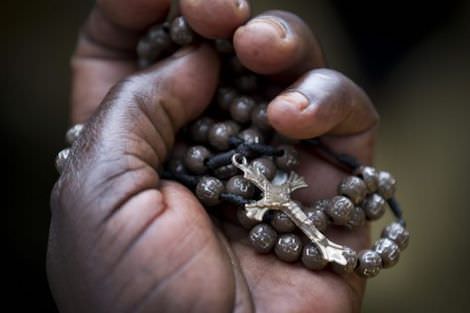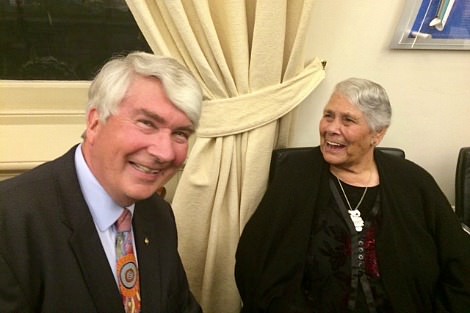Keywords: Fr Frank Brennan
-

AUSTRALIA
- Frank Brennan
- 29 August 2017
10 Comments
In an age of 'budget repair' when both sides of politics are trying to contain the welfare budget, the search for savings and silver bullets is relentless. If Ministers Porter and Tudge are really seeking 'a way of assisting people to get off drugs and back into work', they should convince their cabinet colleagues of the need to increase the Newstart and Youth Allowance so that it might provide a real start for assisting people to survive with dignity while preparing for and getting back into work.
READ MORE 
-

AUSTRALIA
- Frank Brennan
- 20 August 2017
23 Comments
The Royal Commission into Institutional Responses to Child Sexual Abuse has published a 2000-page three volume Criminal Justice Report. One of its recommendations is that the states and territories 'create a criminal offence of failure to report targeted at child sexual abuse in an institutional context'.
READ MORE 
-

AUSTRALIA
- Frank Brennan
- 02 August 2017
29 Comments
What possessed Filippo Grandi, the relatively new United Nations High Commissioner for Refugees, to go public last week, having a go at Australia for our government’s treatment of unvisaed asylum seekers who arrived in Australia by boat? He repeated UNHCR’s demand that Australia terminate offshore processing of asylum seekers on Nauru and Manus Island and that we not outsource our responsibilities to others.
READ MORE 
-

AUSTRALIA
- Frank Brennan
- 04 July 2017
6 Comments
It is no disrespect to those Aborigines and Torres Strait Islanders gathered at Uluru to say that now is the time for the report of the Referendum Council to be scrutinised by our national politicians, and that our elected leaders should pay special heed to the observations of those Indigenous members of the federal parliament who have offered considered reflections on the way forward. In particular, our elected representatives should have regard to the views of Patrick Dodson who is now Bill Shorten's Shadow Assistant Minister for Indigenous Affairs and Aboriginal and Torres Strait Islanders.
READ MORE 
-

RELIGION
- Frank Brennan
- 03 July 2017
There is no point in proceeding with a referendum on a question which fails to win the approval of you, the First Australians. Neither is there any point in proceeding with a referendum which is unlikely to win the approval of the overwhelming majority of the voting public, regardless of when they or their ancestors first arrived in Australia. Given that you Indigenous Australians have spoken strongly through your representatives at Uluru in support of a First Nations Voice, it is now for the Referendum Council to recommend to government a timetable for constitutional change with maximum prospects of a 'Yes' vote.
READ MORE
-

RELIGION
- Frank Brennan
- 26 June 2017
6 Comments
Here in Ballarat, you know better than most other Catholics that respectful relationships in the church community have been rent asunder by the depredations of child sex offenders whose exploits went unchecked by those ordained to exercise tradition, authority, teaching and discipline. We will strengthen respectful relationships only with a voluntary commitment to truth, justice and healing — and not one forced by a royal commission or public odour.
READ MORE
-

RELIGION
- Frank Brennan
- 26 June 2017
6 Comments
These cardinals have a few strong concerns. They think the pope should be setting down clear universal rules that apply to everyone in every situation. Having spent a life time as a pastor in Buenos Aires, Francis knows life is much more complex and messy than that. These four cardinals pine for the papacy of John Paul II. John Paul was a great leader and a great pope for his time. Francis is also a great leader and a great pope for his time, for our time. John Paul and Francis are very different. But then again, the times are very different.
READ MORE
-

AUSTRALIA
- Frank Brennan
- 26 June 2017
7 Comments
Anglican priest, traditional landowner and land rights campaigner David Passi has died. He was the last surviving plaintiff in the historic Mabo decision. A year after the Mabo decision I travelled to the Torres Strait and met James Rice and Passi, the two successful litigants in the case. Returning by boat to the mainland from the island of Mer in the Murray Islands, the waters of the Torres Strait were exceedingly calm.
READ MORE 
-

AUSTRALIA
- Frank Brennan
- 20 June 2017
7 Comments
I am resigned to the boats from Indonesia being stopped and staying stopped. But it is high time to stop the cruel treatment of the proven refugees on Nauru and Manus Island, and provide a permanent solution for the asylum seekers waiting inordinately in the Australian community. Their treatment is separable from the stopping of future boats setting out from Indonesia. The Commonwealth's $90 million settlement of the claim brought by asylum seekers on Manus Island should be a wake-up call to us all.
READ MORE 
-

AUSTRALIA
- Frank Brennan
- 13 June 2017
1 Comment
This evening, we come together deliberately as people of diverse faiths and none, affirming the blessing of life in an inclusive country where all world views are to be respected. We are able to affirm that our spiritual lives sustain and strengthen our public lives and the vitality of the polis. Our Muslim hosts show us how to give thanks reverently for all the blessings of life, and how to attest publicly the spiritual dimension of all human life. Those of us who are migrants or descendants of migrants need to be particularly attentive to the yearnings and aspirations of those Australians who rightly claim an indigenous heritage with ancestors who have thrived on this continent for up to 60,000 years.
READ MORE
-

AUSTRALIA
- Frank Brennan
- 31 May 2017
19 Comments
The consultations conducted in Indigenous communities under the auspices and with the financial support of the Referendum Council have yielded a constant message that Indigenous Australians want substantive constitutional change and not just symbolic or minimalist change. The question is: How much should we attempt to put in the Constitution now, and how much should we place outside the Constitution, or delay for constitutional inclusion until another day?
READ MORE 
-

AUSTRALIA
- Frank Brennan
- 31 May 2017
6 Comments
Indigenous leaders this last week have called for the creation of two new legal entities. They want a First Nations Voice enshrined in the Constitution, and a Makarrata Commission set up by legislation. The Makarrata Commission would supervise agreement making between governments and First Nations and engage in truth telling about history. The envisaged destination is a national Makarrata (or treaty). So the immediate constitutional issue is the creation of the First Nations Voice. There is no point in proceeding with a referendum on a question which fails to win the approval of Indigenous Australia. Neither is there any point in proceeding with a referendum which is unlikely to win the approval of the voting public.
READ MORE